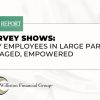
Within two years, the edgiest indie brokerages will not resemble anything you have seen before.
The brokerage of the future (BOF) will still have a 1,000-square-foot office space (or something close to that size) in the coolest part of town, but it will look a lot more like the sharpest Starbucks locations than an office. There will be a strict “no cubicle zone” rule, and this will also apply to private agencies. This space will serve about 100 brokers who cover a larger metro area of 1 million to 2 million people.
Of course, they’ll seldom use the space — just enough to let their clients know exactly how different their philosophy is than that of the typical franchise brokerages. Interviews, often including videos with the media and bloggers, will be held in the office, always driving home the “cool factor” of the brokerage.
But there is far more to the BOF than demonstrating a new attitude regarding real estate. The brokerage will discuss how and why their proprietary technology meets the needs of sellers and buyers better than anything else on the market, and how this allows them to charge smaller fees for quality service. The reporters will be doing all the talking about how cool this real estate company is.
The brokerage company will spend about 10 times the money per year on technology than on office rent. All proprietary technology will be based entirely on meeting the desires of sellers and buyers. Support functions like customer relationship managers (CRMs) will be licensed or purchased. There will be no full-time staff members to take calls or set showings.
The brokerage will actually be far less of a brokerage than an amazing local portal. They will create technology to meet the needs of home sellers and buyers. They will provide an automated valuation model (AVM) superior to Zillow’s, and they will provide the ultimate tools for truly marketing sellers’ homes. This proprietary software will burn through about 70 percent of gross income for the company and will be the best investment they possibly could have made.
The portals’ proprietary buyer search technology will allow a homebuyer to click on a home they love and instantly find other homes offering the same amenities and emotional triggers they seek. Homebuyers never have chosen a home solely based on square footage and bedroom count, and are no longer forced to search for homes this way. This proprietary software will find homes based on the buyer’s emotional triggers. It will be based on artificial intelligence built around the emotional benefits consumers seek. Buyers will love this, thus creating a perpetual flow of Internet leads, plus personal and social referrals.
Each broker will be incorporated as a real business entity. They will no longer pay a monthly “desk fee” or a percentage of their closed sales. Instead, they will bid a yearly amount for all seller and buyer leads coming from the brokerage’s website for particular locations or client types. This is exactly the opposite of the Redfin business model.
The fees bid will be open market-valued. In other words, the individual brokers will bid upfront for the next year based on the volume of leads the brokerage site provided. The market will set the value based on what the brokerage provided. When the broker’s tools provide many leads, the market value and bids go up. If the brokerage fails to provide enough leads, the bid value goes down. The brokerage is paid only what it deserves, and the broker pays only what he or she thinks is fair based on what the brokerage actually provided. Other interested brokers will keep both sides honest. There will be no franchise fees.
When the brokerage does an excellent job of providing leads and all of the brokers do well, everyone will profit. Brokerages will base fees on the value they provide to their brokers.
Cutting-edge and highly productive brokers will flock to this new business model. But the brokerage will keep its numbers at or below 100 so that benefits do not get diluted. Brokerages will no longer get paid for mass volumes of low-producing agents. Instead, those with elite producers will come to financial terms based on nothing but production.
It will be the brokerage’s responsibility to provide superior Internet tools, but it will be the individual broker’s job to manage a personal company and provide additional local content.
Within the areas or client types each broker has bid for, they will provide weekly articles about the areas and client types, along with supporting videos and social site updates.
The brokerage will have one primary job: to provide quality leads by creating technology superior for meeting consumer needs. The brokers will run their own businesses like real professionals. When they get too busy, they will expand their own company.
Sound too exotic? It is not; it’s your only chance in the marketplace. You could choose to form one of these BOFs yourself. Or you can wait for your new competition to do it. But don’t wait for your franchise to do it … that will never happen.
Creed Smith is living the creation and implementation of innovation via REalMARKABLE.com, QValue.net, DemonOfMarketing.com and DenverInvestor.com (coming soon).
The post Building the independent brokerage of the future appeared first on WFG National Title Insurance Company.





